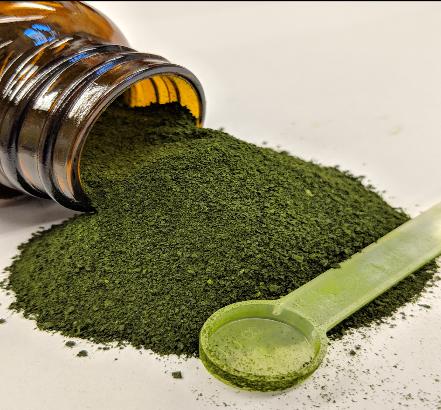Project is the first to test green algae on symptoms related to human digestion

Credit: Frank Fields, UC San Diego
A widespread, fast-growing plant called Chlamydomonas reinhardtii is famous in scientific laboratories due to its position as the world’s most exhaustively studied algae.
For decades, the green, single-celled organism, which primarily grows in wet soil, has served as a model species for research topics spanning from algae-based biofuels to plant evolution. While other species of algae have been used as dietary nutraceuticals that provide beneficial oils, vitamins, proteins, carbohydrates, antioxidants and fiber, the benefits of consuming C. reinhardtii were previously unexplored.
Researchers at the University of California San Diego recently completed the first study examining the effects of consuming C. reinhardtii and demonstrated that the algae improves human gastrointestinal issues associated with irritable bowel syndrome (IBS) such as diarrhea, gas and bloating. Results of the project are published in the Journal of Functional Foods.
“People have been looking at this algae for decades, but this is the first study to show what many of us have suspected–it’s good for you,” said principal investigator and algae expert Stephen Mayfield, a distinguished professor in UC San Diego’s Division of Biological Sciences and co-director of the Food and Fuel for the 21st Century Program (FF21). “This is exciting because it demonstrates a clear benefit: If you have IBS-like symptoms, this is good for you.”
For years researchers in Mayfield’s laboratory have been exploring C. reinhardtii as a cost-competitive and sustainable source of valuable plant-based products, specifically pharmaceuticals and biofuels. Now, working with several collaborators, including UC San Diego’s John Chang (School of Medicine), Rob Knight (School of Medicine, Jacobs School of Engineering and Center for Microbiome Innovation) and the San Diego-based startup Triton Algae Innovations, they turned their attention towards investigating the algae as a nutritious food additive for improving human health.
The C. reinhardtii biomass used in the study, which was grown by Triton Algae Innovations, was subject to rigorous safety testing and designated as “Generally Recognized As Safe” by the U.S. Food and Drug Administration, green-lighting the use of the organism in a human study.
Preliminary data in mouse studies demonstrated that consuming C. reinhardtii significantly reduced the rate of weight loss in mice with acute colitis, which is generally linked to inflammation of the digestive tract. Building off these results, the researchers set out to test for a similar effect when the algae was consumed by human volunteers, including those with and without symptoms associated with IBS. Volunteers consumed daily spoonfuls of powdered C. reinhardtii biomass and reported their gastrointestinal health for one month. Of the hundreds of interested participants in the project, data from 51 volunteers met the study’s requirements for inclusion in the final data analyses.
Results showed that participants who suffered from a history of frequent gastrointestinal symptoms reported significantly less bowel discomfort and diarrhea, significantly less gas or bloating and more regular bowel movements.
“The benefits of consuming this species of algae were immediately obvious when examining the data from both mice and humans who suffered from gastrointestinal symptoms,” said Frank Fields, a research scientist in Mayfield’s lab and lead author of the paper. “I hope that this study helps destigmatize the thought of incorporating algae and algae-based products into your diet–it is a fantastic source of nutrition and we have now shown that this species of algae has additional benefits to animal and human health.”
Volunteers also were provided with stool sampling kits and sent samples to the American Gut Project, a citizen science effort led by Knight and his lab, to assess any changes in their microbiomes. The results indicated that the gut microbiome composition remained diverse, which is typical of healthier individuals, and that no significant changes to the composition of their gut microbiome occurred during the study as a result of consuming the algae.
The researchers say much more testing with larger groups of participants across longer time periods is needed. At this point, they are unclear about how the algae works to improve gastrointestinal health. The scientists believe the benefits could be traced to a bioactive molecule in algae or perhaps a change in gene expression of gut bacteria caused by algae consumption.
Still, the observed results in human volunteers led them to conclude in the paper that “the addition of C. reinhardtii into the diet will not only add nutritional value but may also function to relieve some gastrointestinal symptoms of certain individuals.”
###
The full coauthor list includes Frank Fields, Franck Lejzerowicz, Dave Schroeder, Soo Ngoi, Miller Tran, Daniel McDonald, Lingjing Jiang, John Chang, Rob Knight and Stephen Mayfield. Collaborators included the California Center for Algae Biotechnology, American Gut Project, Center for Microbiome Innovation and Jacobs School of Engineering.
Media Contact
Mario Aguilera
[email protected]
858-822-5148
Related Journal Article
http://dx.




